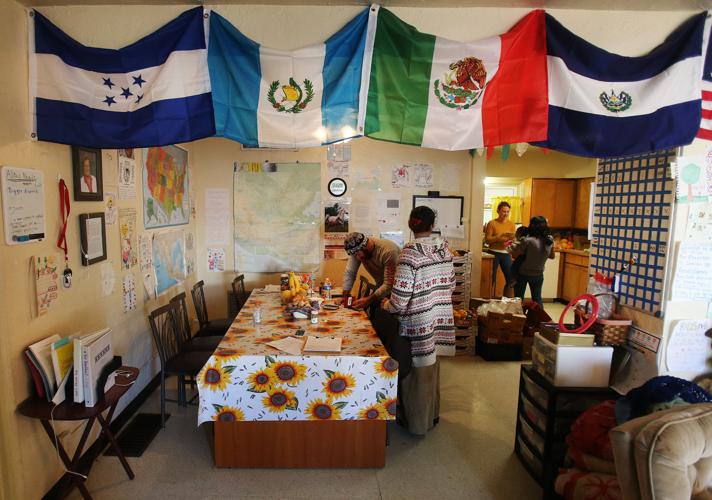The number of Central American families crossing the U.S.-Mexico border is spiking again — just as the federal government is going after the first wave.
Immigration officials are targeting migrants who arrived in 2014 and haven’t left despite a final deportation order. On the first weekend of January, Immigration and Customs Enforcement rounded up 121 adults and children in Texas, North Carolina and Georgia who the government said had exhausted all legal recourse.
So far, that’s not stemming the tide of Central American families — mostly women and their children fleeing violence and extreme poverty in their home countries — crossing into Arizona on their way to join family members in other states. More than 1,800 unaccompanied minors and 1,500 single parents and their children have been apprehended the first two months of the fiscal year in Arizona.
The Yuma Sector in particular has seen significant increases. Nearly 900 families came through in October and November — up from just 59 this time last year — surpassing the 679 families apprehended in the Tucson Sector, Customs and Border Protection data show.
Before this recent uptick, the numbers had been dropping. Fiscal year 2015 saw nearly half of the people apprehended in 2014 in part due to increased enforcement efforts in the United States and Mexico. Over the last year, Mexico deported more than 100,000 Central Americans.
Last summer, a Catholic Community Services shelter in Tucson received an average of two families a week. But Casa Alitas took in 45 families in November and more than 100 in December — a total of about 330 people, said Jamie Flynn, AmeriCorps VISTA in-house volunteer.
Casa Alitas provides a bed, shower and food for families released by the Department of Homeland Security with a notice to appear before an immigration officer at their final destination to continue processing their cases. Volunteers help them get in touch with family members and help them navigate how to buy their bus ticket to get there.
The recent migrant roundups drew outrage from immigration attorneys and advocates who say the government is trying to use these deportations to deter others from coming.
“They fundamentally misunderstand the problem,” said Laura Lichter, former president of the American Immigration Lawyers Association who volunteered to defend women and their children held in detention centers in New Mexico and Texas. “Because they don’t have an accurate understanding of the issue, they continually choose solutions that won’t solve anything.”
No need to think twice
Guatemala, Honduras and El Salvador have some of the highest murder rates in the world.
Killings in El Salvador spiked 70 percent last year according to news reports, and the tiny country is likely to take the title as the murder capital of the world from Honduras. Gender-based violence is also rampant in this region, experts say.
All of this is coupled with systemic poverty, limited employment opportunities and political instability that continue to push people out, the Migration Policy Institute reported.
Because the United States is already home to a large number of Central Americans, this is a likely destination. But Central American refugees have also sought asylum in Mexico, Costa Rica and Nicaragua.
A Honduran woman who arrived at Casa Alitas in November and is still in Tucson said she fled gang violence.
The woman, who asked not to be identified because she fears for her safety and is a victim of sexual assault, said she was earning a living in her native Honduras as a single mother of a 6-year-old girl and a 9-year-old boy, selling hojuelas, a Honduran dish made of fried dough, on the streets.
“It never crossed my mind to come here,” she said.
Last year, she saved enough money to open a small food stand.
“Everything was going well,” she said, until one day a man dropped off a note saying she had to start paying the equivalent of $90 a week, a “cooperation” fee for protection. She refused and weeks later — on her birthday — her business was burned to the ground.
She said she went to the police, but they told her nothing could be done because there were no witnesses. So she started selling on the streets again.
One day in May, she said, gang leaders sent three men to beat her and rape her.
“They left me there for dead,” she said choking back tears. But a woman walked by and took her to the hospital.
After that, she said, they threatened to take her son.
“At that moment I didn’t think twice about it,” said the 31-year-old. “I knew of mothers who had lost their sons because they use them to rob, to kill. There are 12-year-old boys who kill.”
As soon as she saw an opportunity to escape, she fled with her son, leaving her daughter behind with her mother.
“I didn’t have money to take both of them,” she says.
It took her more than two months to reach Nogales, where she presented herself at the port of entry.
The “pain of poverty”
When Mike Wilson, a local volunteer with Casa Alitas, sees these families, he sees a sense of despair and hopelessness, he said.
Together with his partner Susan Ruff, Wilson provides housing when Casa Alitas runs out of space.
“I grew up very poor here in Tucson and I understand the pain of poverty,” he said.
Normally they don’t ask people why they came, he said, but recently a Guatemalan woman told him she earned the equivalent of about $2.50 a day washing clothes and couldn’t feed her family. She saw no way out.
Another woman, also from Guatemala, told them how gang members cut off the top of her 9-year-old son’s finger because she wouldn’t pay.
“This speaks to the violence and it speaks to the government not being able to protect its own citizens,” he said.
Last fiscal year, more than 80 percent of Salvadoran, Guatemalan and Honduran women screened by asylum officers were found to have a credible fear of persecution if they returned to their home countries, the Migration Policy Institute reported. That’s the first step for applying for asylum in the United States.
After the news of the targeted operations broke, Homeland Security Secretary Jeh Johnson issued a statement explaining the government’s position.
“Our borders are not open to illegal immigration,” he said. “If you come here illegally, we will send you back consistent with our laws and values.”
In 2014, Johnson said the government would focus its limited resources on deporting people who pose a threat to national security and public safety and recent border crossers. The families arrested last weekend were those who came in after May 1, 2014, and were given final removal orders and had exhausted legal remedies, Johnson said.
The government’s operations should come as no surprise, he said. “I have said publicly for months that individuals who constitute enforcement priorities, including families and unaccompanied children, will be removed.”
Whether the families targeted for deportation had exhausted all legal options is something the lawyers and advocates debate. A group of pro bono lawyers and government officials from El Salvador have said they’ve temporarily stopped the deportations of several families detained over the weekend.
“Asylum cases are to immigration law what brain surgery is to medicine,” said Lichter, the immigration attorney. “It is probably some of the hardest legal work there is out there and if you don’t have a lawyer, you don’t win your case.”
As of Dec. 29, 2015, out of nearly 987 completed cases of detained parents who crossed the border with their children, 788 were ordered to leave, the Executive Office for Immigration Review reported, and 68 percent were done in absentia, meaning the person didn’t show up to the hearing.
The odds of being allowed to remain increase more than fourteenfold if women and children had representation, the Transactional Records Access Clearinghouse at Syracuse University found. Only 14 percent of the women and children whose cases were closed as of June had representation.








